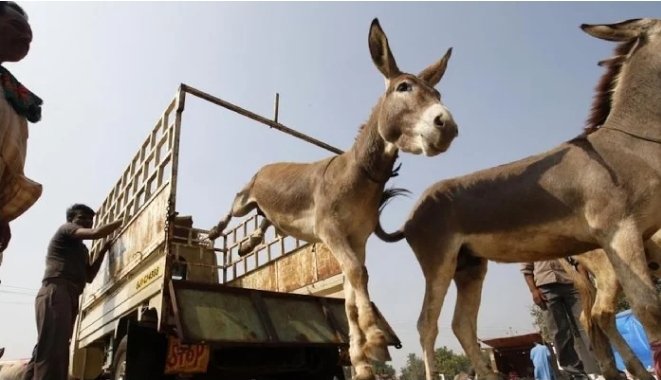A Unique Initiative Under CPEC
A Chinese company has announced a multi-million-dollar project to establish donkey farms in Pakistan’s northwestern city of Peshawar. Under the plan, around 80,000 donkeys will be bred annually for export to China.
The initiative comes as part of broader economic collaboration between Pakistan and China under the China-Pakistan Economic Corridor (CPEC). Officials say the investment reflects growing diversification in agricultural cooperation beyond traditional crops and livestock.
According to Pakistan’s Ministry of Food Security, the project involves a $37 million investment by the Chinese firm Sheng Ying. The company will build 40 modern farms and a scientific laboratory to support donkey breeding and ensure international standards are met.
Phased Development Strategy
In the first three to five years, the focus will be on improving the quality and population of donkey breeds. After this stage, the project is expected to reach full-scale production, enabling exports of nearly 10,000 donkeys every month.
These exports will primarily include donkey meat and bones, which will be processed and shipped exclusively to China. Concerns are not unfounded. In the past, authorities have uncovered cases where donkey meat was illegally sold in local markets, including a donkey meat scam in Islamabad.
A state-of-the-art “Donkey Breeding Laboratory” is also being established at the University of Agriculture in Peshawar. This facility will ensure breeding standards align with international guidelines and scientific best practices.
Rising Demand in China
Experts point to rapidly increasing demand in China for donkey-based products. Donkey meat is consumed in parts of China, but the greater demand comes from donkey hides and bones. These are used in traditional Chinese medicine, particularly for producing ejiao, a gelatin believed to improve health and vitality.
China’s donkey population has declined significantly over the past two decades due to urbanization and reduced farming. To meet demand, the country has turned to imports from Africa, Central Asia, and now South Asia.
Industry analysts suggest that Pakistan’s entry into this supply chain could open a new export sector, particularly as the country seeks to diversify its struggling agricultural economy.
Economic Impact for Pakistan
Pakistani officials and livestock experts believe the project could create hundreds of jobs in Peshawar and surrounding areas. It is also expected to boost Pakistan’s profile as a niche player in the global livestock market.
“This is a new dimension in Pakistan’s livestock industry,” a Ministry of Food Security official said. “If successful, Pakistan could become a major exporter in this unique field.”
The project is also being seen as a step toward reducing Pakistan’s heavy trade deficit with China. By exporting livestock products, Islamabad hopes to balance trade flows, which currently favor Beijing.
Controversy and Local Reaction
Despite its economic promise, donkey farming has been viewed with skepticism in Pakistan. The animal is often associated with burden labor rather than commercial value, and cultural perceptions may affect local acceptance of the project.
However, supporters argue that by focusing solely on exports, the project avoids cultural sensitivities while still generating revenue and employment. Farmers in the region are also expected to benefit through partnerships and training opportunities.
A Growing Export Niche
Globally, donkey farming has attracted attention in recent years, especially as China looks for stable suppliers. In African countries like Kenya and Ethiopia, similar projects have created export opportunities but also sparked debates over animal welfare and sustainability.
For Pakistan, the Peshawar project could mark the beginning of a new chapter in livestock exports, provided it balances economic gains with ethical considerations.
Outlook
As construction of the farms and laboratory begins, much will depend on whether Pakistan can maintain breeding quality and scale production sustainably. If successful, the initiative may not only strengthen bilateral trade with China but also place Pakistan within a growing global supply chain for donkey-derived products.















